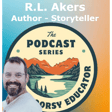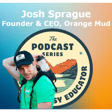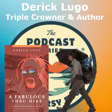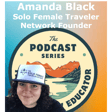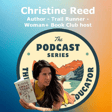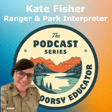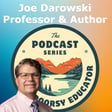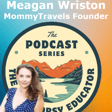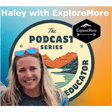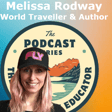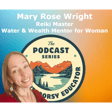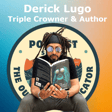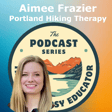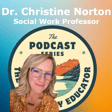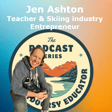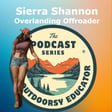Become a Creator today!Start creating today - Share your story with the world!
Start for free
00:00:00
00:00:01

Mills Kelly
Join Alasdair and Mills as they discuss the history of the Appalachian trail, podcasting, and his brand new book!
Recommended
Transcript
Introduction to Outdoorsy Educator Podcast
00:00:00
Speaker
Hello and welcome to the Outdoorsy Educator Podcast, the show where curiosity meets the open road. I'm your host Alistair and I invite you to join me as we explore the world through travel, nature, getting outside and the power of learning.
00:00:17
Speaker
Each episode we will dive into stories from inspiring educators, adventurers and global citizens who are reshaping what it means to learn whether it's in a classroom, on a mountain trail, or even halfway across the world. From backpacking trips that change your perspective to educational journeys that transform communities, we will cover it all. So pack your curiosity, lace up your boots, and let's discover how the world teaches us.
00:00:44
Speaker
One step, one story, one adventure at a time.
Sponsor Highlight: Whole Earth Provision Company
00:00:56
Speaker
Since 1970, Whole Earth Provision Company has been the Texas outfitter for side quests, big and small. Whether you're gearing up for the open road, chasing a trailhead, or hunting for that just right gift, they have got you covered.
00:01:12
Speaker
Think durable clothing, shoes that will actually go the distance, gear that's road trip ready, and books, puzzles, and toys that will spark wonder at every age.
00:01:23
Speaker
You'll find Whole Earth in Dallas, Austin, Houston, and San Antonio, or anytime online at wholeearthprovision.com. And hey, because you're rolling with the Outdoorsy Educator podcast, here's a little extra love.
00:01:37
Speaker
Use the code OUTDOORSYEDU for 20% off your next adventure at Whole Earth.
Guest Introduction: Mills Kelly
00:01:47
Speaker
On today's episode of the Outdoorsy Educator podcast, we have a historian, a podcaster, professor, photographer, a man of many, many talents, Mills Kelly. Mills, how are you today?
00:02:00
Speaker
Oh, I'm doing great, Alistair. Thanks so much for having me. Oh, absolutely. Thank you. Why don't we start off by you just telling the audience a little bit about yourself? Okay, so I'm a very recently retired professor of history. I taught for 30 years and twenty five almost 25 of those at George Mason University, which is where I retired from.
00:02:18
Speaker
And I'm a historian of the Appalachian Trail. have two books ah out. One of them came out today. and And so I'm pretty excited about that. And Appalachian I'm also the archivist of the Potomac Appalachian Trail Club, and which is one of the oldest of the Appalachian Trail Clubs and the one based here in the D.C. area.
00:02:40
Speaker
Very nice. And how did you first get involved with the Appalachian Trail? um Was it just as a hiker or more from a historian perspective?
Early Experiences with the Appalachian Trail
00:02:49
Speaker
You know, I got started as a young boy scout back in 1971, which dates me.
00:02:54
Speaker
But no, I yeah he grew up in the Washington, D.C. suburbs and our the Appalachian Trail is pretty close, you know, under two hours. And so our scoutmaster at the time, he believed that the purpose of scouting was to backpack.
00:03:12
Speaker
And this was a guy who had he was ah in the army. He was a major in the army. he had fought his way across the Pacific in the Second World War. And and so his attitude was, you know, so what if it's 15 degrees outside? Just wear warmer clothes.
00:03:26
Speaker
And, ah you know, so what if so what if it's snowing? Make sure you bring your gloves. You know that was sort of his attitude about life. And so he took us backpacking on this trail near us that was called the Appalachian Trail.
00:03:40
Speaker
And I didn't even know that it was a 2,000 mile long trail. And he was from California. I'm not sure if he knew that either. Or if or if he did or if he did, he just never mentioned it. And and then in my second year of of scouting, the somebody in our neighborhood ah wrote a book about his through hike the year before.
00:04:02
Speaker
And he wasn't the first through hiker by any chance. It was a guy named Ed Garvey, but he was the first person to write a book about it. And so he came to our scout meeting one night and gave a slideshow about his about his hike. And I remember thinking, wait, that trail we walk on all the time that goes all the way to Georgia where my grandparents live and all the way to Maine.
00:04:22
Speaker
That's crazy. And so that's how I got
Career Transition to Historian
00:04:25
Speaker
started. And it's just been a part of my life ever since. That's just fantastic. And obviously you went on to study history and that is your career.
00:04:33
Speaker
um Can you tell us a little bit about that? Because we do quite a lot of teachers that listen to the podcast. What was your pet professional path? Yeah, so I, you know, I've had a lot of different careers. I feel like I was a restaurant manager right after college and then I was a marketing consultant for a decade.
00:04:48
Speaker
And while I was a marketing consultant, I went to graduate school part-time and kind of worked my way very slowly through first my MA and then my PhD. And and i got my PhD actually in modern East European history, which in the early 1990s was a great time to be doing that because communism had just collapsed. And so it it was it was possible for me to do archival research in in Eastern Europe that couldn't have been done five or six years earlier.
00:05:15
Speaker
and so And so I did that for a long time. And and then in 2010, I was an associate dean at the university and yeah I was part of a team that helped set up an undergraduate research program, which is one where the students, undergraduate students, conceive of a research project and then they go find a faculty mentor.
00:05:39
Speaker
they're not They're not helping faculty with faculty research, they're doing their own work. and and And so I was part of the team that set that up and and then and no students were coming to work with me because none of them had the language skills necessary to do East European history.
00:05:54
Speaker
and And I was really disappointed because had put a lot of effort into setting that program up and then I wasn't getting any of the benefit. So I thought, well, if I'm gonna if i'm going to attract um you know mentees, then I'm going have to do something in English instead of Czech or Polish or Slovak or whatever. And so I and thought, well, if I'm going to do something in English, that means American history or British history or you know Australasian history. and And so American history would be easier because it's close by. And and and so then, you know, since I didn't I didn't really have any background, strong background in American history, I could sort of pick whatever I wanted.
00:06:37
Speaker
I was liberated by my lack of expertise. Right. And and so but so I wondered, you know, are there any good books about the history of the Appalachian Trail that are written for the public?
00:06:51
Speaker
because I do public public history is kind of what I do. and and and And the answer was no, there really weren't. There were several good histories of the trail that were written for other historians, you know replete with footnotes and analysis and all that, but but they weren't really geared toward the general reader, which is what I wanted to do. And and also that kind of work, you know our students are really interested in public history because it helps them get jobs in museums, archives, libraries, whatever.
00:07:19
Speaker
And so I thought, well, I'll just write about the thing that I love, which is the Appalachian Trail. So it was kind of a ah marrying of my vocation and my avocation, if that makes sense.
00:07:32
Speaker
Oh, absolutely. um And so what was the first piece you wrote? Because I've got one of your books here. What was the first thing you wrote about the ATE? Well, so the first first book I wrote was called Virginia's Lost Appalachian Trail.
00:07:47
Speaker
And and it's it's a good example of why archives are dangerous places if you're a historian. Because ah i set I had set out to work in 2016 on the book that just came out um today.
Appalachian Trail Book and Discoveries
00:08:02
Speaker
and And i was in the archives and I i ran across a document which talked about the route of the Appalachian Trail along the border between Floyd and Franklin counties, Virginia. And I thought to myself, well, it doesn't go there. And so it's like, you know, i was like Alice, all of a sudden a rabbit hole opened up in front of me. Yes.
00:08:23
Speaker
And so I had to decide. And I tell my students this all the time. You know, you're kind of professionally obligated to at least peer into the rabbit hole. And ah but that 98 percent of the time you back away because you have other things you need to do.
00:08:37
Speaker
And but and honestly, if I had not been born in Franklin County, Virginia, and we moved to the D.C. area when I was very small. But but that's still kind of my home place.
00:08:49
Speaker
and If I hadn't been born there, I probably would have backed away. But I thought, well, I'm. I want to understand more about this. And so I started poking at that. I jumped into the rabbit hole and I started poking at that problem.
00:09:00
Speaker
And, um and what I found was that it was a really interesting story because the Appalachian trail gets rerouted all the time for a variety of reasons. And,
00:09:12
Speaker
They've acquired some new land that takes the trail to a better view or avoids a difficult road crossing or there's a landslide or that sort of thing. And so there are a lot of very small reroutings of the trail, but this was 300 miles, which was 15% of the trail at the time.
00:09:29
Speaker
which was fifteen percent of the trail at the time and And so i i just started you know researching that and and and it turned into this book. Really, it started with just me trying to understand something and it turned into a book because When I understood what I could understand through the archival record, I realized I didn't know enough.
00:09:50
Speaker
So I got in my car and I just drove down to Floyd County and Franklin County and Patrick County and Carroll County. And, and, and I started just talking to people. And the more I talked to people, the more I realized that the book was, that the book that was emerging in my mind was sort of about the Appalachian trail, but it was also about the persistence of historical memory in rural places.
00:10:14
Speaker
Right. yeah I can just imagine this getting deeper and deeper. And yeah these things were passed down from generation to generation. Because, you know, the Appalachian Trail left that part of the state in 1952. Right. People there talk about it like it left 10 years ago.
00:10:30
Speaker
Right, isn't it? Yeah, very interesting. yeah I suppose a lot of it is oral history that's been passed down. and yeah yeah Did you find a lot of stuff was documented and written down or did you really have to talk to people? I had to talk to people.
00:10:43
Speaker
yeah i had to talk to people and um And along the way, I made a number of really good friends. ah One of them sadly passed away the early this year. Doug Bell has the the trail went right across his grandfather's farm. He was raised by his grandfather because his parents died when he was young. And, and and you know, he was just full of pride about the fact that the trail had gone across his grandfather's farm. and
00:11:08
Speaker
ah Ralph Barnard is probably, I guess Ralph's 88 this year, 89. eighty nine And he, you know, he's just such a funny guy. and And everybody warned me to stay away from Ralph because they said he was like really crusty and grumpy.
00:11:22
Speaker
and And I don't know who they were talking about because he's never been anything but kind and friendly to me. But But a bunch of these folks, in addition to telling me stories from their families and and like Ralph actually remembers the hikers because he's old enough.
00:11:38
Speaker
They pulled out of boxes in the closet, old family photos of of the trail and of hikers at the family farm and that kind of thing. Stuff that's not in any archive anywhere. Right. I suppose you could say that is the true archive, isn't it? That's really it's fascinating.
00:11:53
Speaker
Yeah. Yeah. So it was great. And I, you know, so I have a bunch of friends in in that part of the state now. um I would say their average age is probably 75. Right.
00:12:04
Speaker
Well, long may these stories be continued to be passed down. Yeah. Yeah. I've got a copy of your book here. I've read it, of course, when it came out and it's a, Yeah, it's so interesting. um you know I'm really quite fascinated by the human history as well as the the geographical changes that have been made, but the people's land it goes through. um Down here in Texas, um they're just getting started working what they're calling the XTX Trail, which is a cross Texas trail.
Development of a Cross-Texas Trail
00:12:32
Speaker
um that will It would rival the AT in length somewhat, go all the way across the southern part of the state.
00:12:38
Speaker
And something that I found particularly interesting is there is a lack of public land here. I can't remember the exact percentage, but there's a almost all land is privately owned.
00:12:49
Speaker
So they really felt that this would be a huge undertaking, having to convince people to let the trailer run through you know the edge of of large w ranches and farmland. And they they created all these scripts, I believe, you know things. How can we convince people this is a good idea?
00:13:06
Speaker
But they really didn't need to in the end. Everyone they spoke to was so welcoming. you know as As long as there an understanding of you know leave no trace, pack out what you you bring, all of that.
00:13:17
Speaker
People were so have have been so welcoming to having through hikers come through their land. Yeah, that's great. you know i taught it I taught at Texas Tech for three years in the late Oh, up in Lubbock.
00:13:30
Speaker
Yeah, up in Lubbock. And, you know, i i I appreciate what you say about the lack of private land because my children were, i guess, four and two when we moved up here to Virginia. But I wanted them to start spending time in nature, walking. And and the nearest state park was 90 miles away.
00:13:48
Speaker
That would that be, let's possibly Palo Dura or the Crab Rock Canyon. It was the south of Palo Dura. It was Cap Rock Canyon. Yes. Yeah. I've just been there once. And it's somewhere that I tell my wife, it's left just enough of a taste of mouth to really want to go back to spend more time with the buffalo and the history thing. Right. Right.
00:14:06
Speaker
So, but at the same time, you know, one of my students who's now a professor in North Texas, he he was a collector of ghost towns in West Texas.
00:14:17
Speaker
And and he would find on he would look at a map from 1990 and a map from 1890. And he would look for towns that were on the map in 1890, but were not on the map in 1990.
00:14:28
Speaker
And and then he would just get on his horse because he was a true cowboy. And he would get on his horse and ride off across the range and and to find the remnants of these old towns. And I asked him once, did you know, did any of the landowners ever give you hard time about that? and he said, no, why would they?
00:14:45
Speaker
They were all happy. you know Yeah, it's it's definitely the general consensus. Right. And that's how it happened with the Appalachian Trail, too. I mean, when the trail was declared complete in 1937, of the 2,000 miles, only about 800 miles were on public land.
00:15:01
Speaker
and so i didn't realize that. Yeah. yeah and so And it's still a tiny fraction. I don't know, 1%, 2% is still on private land It's a national park these days since 1968.
00:15:15
Speaker
And so the Park Service um you know has arrangements with landowners where they have right of first refusal on purchasing the land when the landowner passes. and and And so they're slowly but surely acquiring those last little bits. But yeah, it was all easements and you know for which landowners were compensated $1 per year.
00:15:36
Speaker
and And that was just to show that there was an exchange of value. Right, understandable. um I was thinking this morning before we started recording that I first became aware of you and your work when I stumbled across the
The Green Tunnel Podcast Journey
00:15:50
Speaker
Green Tunnel podcast.
00:15:52
Speaker
I'd love for you to tell us a little bit about the story behind this. I mean, it's a cornerstone for me of hiking, podcasting and Appalachian Trail history. How did that start at GMU and what part did you play in that?
00:16:05
Speaker
Well, thanks. I'm glad, you know, you're one of our biggest fans, so I appreciate that. ah and And Allison says to tell you hello, by the way. Oh, that's very kind. very good good I'm going up to GMU in about week and a half. Well, you have to stop by to see her. because Yeah, I'm going to reach out. Yeah, she would love to see you.
00:16:22
Speaker
so But so it started because we so we launched a podcast studio um in in sort of right around the time that COVID happened and immediately after the shutdown. And ah because it was a thing we could do. and And, you know, we have a strong public history mission.
00:16:44
Speaker
And so one of the many ways that you reach out to public audiences these days is through podcasting. And we were especially interested in it because and podcasting in general, because the, um,
00:16:57
Speaker
the the sort of people under 40 are much more likely to be listening to podcasts and rather than, you know, going to a website that we created. and also the podcast audience is much more diverse than sort of the website audience. And and so it was a way to do that. and And we also saw it because our Center for History and New Media is an educational organization It has an educational mission. It was a way for our graduate students to develop some experience and skills in podcasting. So all those things came together.
00:17:29
Speaker
And our first show was it was a really wonderful show, but kind of niche. in And it was on the history of the American consular service. And done by Abigail Mullen, who helped found the the podcast studio. She's now a professor at the Naval Academy.
00:17:46
Speaker
And um so she was really interested in the history of the U.S. consuls. And so it's a great show, but never really found you know big audience just because it is diplomatic history in itself. It's kind of a niche thing. And then this was a niche of a niche.
00:18:03
Speaker
So, but we learned a lot doing that. And then because I was doing all this work on the Appalachian Trail, and we decided to do one on the Appalachian Trail. You know, we've had several other shows, one, a really great one on the history of American antisemitism called the Antisemitism USA, and another on the American Revolution as a global conflict.
00:18:24
Speaker
um And so, you know, not just about the Battle of Bunker Hill and Yorktown and George Washington, but about starting way back before the Seven Years War and coming up to the press up to the that the the end of the revolution. so so So that's how it got started. And I was leading the Center for History and New Media at the time.
00:18:44
Speaker
and and And, you know, the podcast itself turned out to be very popular. we were very happy with it. and We've had over 225,000 downloads. yeah Yeah. And yeah, it's been really great. I mean, we ended the show in the spring of 24 with 50 episodes produced. And that's because we had largely told the story.
00:19:08
Speaker
Right. You know, so and one of the things we talked with our grad students about ah a lot was how do you bring something to an end? Something that you're passionate about, something that has been really successful.
00:19:21
Speaker
When do you know it's time to stop? And then if so, how do you do that? And so it was a really good learning experience for them as well. That's, yeah, absolutely fascinating because it's something I i speak about um with some of my students is this is how information is communicated more and more.
00:19:37
Speaker
um and And it's really a transferable skill across so many disciplines, this being able to podcast, being able to speak in that way. So what an opportunity for these grad students.
00:19:49
Speaker
Yeah. And a couple of them, a couple of them got good jobs in part because not wholly, but in part because of their experience in podcasting. It got them, maybe it moved their resume from the looks interesting pile to the we should talk to pile.
00:20:04
Speaker
Yeah. Absolutely. um in in you know We have very similar lines of work and I get more people asking me about my podcast than almost anything else because it it really is piquing interest, um which is one of the reasons I started this. is yeah My own interest was piqued by podcasts such as yourself.
00:20:22
Speaker
and it's a yeah It's just a ah fascinating medium for communicating information. It makes it, as you alluded to, very accessible to a whole range of people. Right. And and the other thing, at least for, you know, for history students, they're used to writing long form essays with long, complex sentences.
00:20:41
Speaker
And ah the, you know, the podcast medium, especially the way we were doing it, which was more scripted rather than, you know, individual just sort of live interviews. and they had to learn to speak in shorter phrases and right and, be, so be more concise and, and, or they had to learn how to edit because I was the host of the green tunnel edit. You know, we would have, I don't know, probably three hours worth of content for each 30 minute episode. And then they had to compress that down into a meaningful narrative and that's, that's challenging. And so it was a really good skill for them to develop.
00:21:21
Speaker
that That's wonderful. and you You said at the beginning that you've ah you've recently retired, but how are you still involved in the Appalachian Trail?
Trail Maintenance and Archiving
00:21:29
Speaker
So these days I'm still involved in a couple of ways. First of all, and in many ways, most importantly, I'm a volunteer on the trail because it's still it's still the only national park run by volunteers. And and I mean, there are thousands of people who put in volunteer hours on the Appalachian Trail every year.
00:21:44
Speaker
And so I maintain the Manassas Gap shelter. the The trail has about 250 shelters from end to end. And so the Manassas Gap shelter, which is only about a mile from where I'm standing,
00:21:55
Speaker
um is one of the original shelters along the trail. It was built in 1937 by the Civilian Conservation Corps and built out of old chestnut logs that they peeled on the site.
00:22:06
Speaker
And so I maintained that shelter and ah you know last week we were told we couldn't do any volunteer work because of the government shutdown but now we've gotten the word that it's actually okay that the insurance policies will cover us so uh so i'm going to go back after we finish this i'm actually going to go over there and and then i'm also the archivist of the potomac appalachian trail club which is nearing its centennial um our club was formed in 1927 with the express purpose of building the Appalachian Trail in the mid-Atlantic. and
00:22:41
Speaker
and And so the PATC and the main club have the two longest stretches of the trail that they're responsible for, um over 260 miles each. And so I'm the archivist of that club. And that's been great because I've been able to bring a lot of George Mason students in to do archival or archival internships.
00:23:01
Speaker
That's just fascinating. So over your your decades of being involved with the AT, and this is ah it could be a very broad question, but how do you feel has changed?
Cultural Impact on Hiking Popularity
00:23:12
Speaker
So it's changed in ah in, it's, you know, as historians, we're always interested in what changes and what doesn't.
00:23:18
Speaker
And so, so first let me tell you what, what changes or what has changed. The first is it's wildly popular. Right. Right. you know for the first four well so the trail began and in in 1921 but the appalachian trail conservancy was formed in 1925 with so things really cranked up in 1925 and so from the mid-20s through the mid-50s so for those first three decades It was a it was sort of an acquired taste, I guess you could you could call it. I mean, the the trail clubs that put a lot of effort into it, used it extensively and scouting organizations used it. Both boys and girls used it extensively.
00:24:03
Speaker
Church groups. um You see a lot of evidence of church groups hiking on the trail. But but other than that, it just wasn't really popular. in that sense.
00:24:13
Speaker
And then in the 1960s, the whole kind of back to nature movement began in the United States. And, you know, was hippie times. And so, you know, it wass popular to drop out and hike and things like that. And um but also um the 60s was the beginning of a change in Americans approach to athletic activity in general.
00:24:37
Speaker
and Before that, we we always did things in groups. And if you saw if you look at the pictures of hikers on the Appalachian Trail before the nineteen sixty s they're always hiking in really large groups, 10, 20, 30 people. wow And um in the 60s, we started moving toward more individualized athletic activities. Jogging became a thing.
00:24:59
Speaker
Right. You know, and that's the thing you you could do with other people, but mostly you did it by yourself or maybe with one friend. um Aerobics became a thing. And in early 1970s, and again, you maybe you went to an aerobics class, but you just kind of showed up for your aerobics class and then you went home.
00:25:15
Speaker
You know, you weren't on a team. you Right. I understand. yeah And and so individualized activity became much more popular. And so having a hiking trail nearby was it was, you know, it was available. And so so there's a real upsurge in activity on the Appalachian Trail beginning in the late nineteen sixty s To the point where by the by around 1980, people were starting to feel like the trail was too crowded. There are too many hikers.
00:25:44
Speaker
If they'd only known right now that that, you know, in 1980, there were probably a million people that got set foot on the trail. Nobody knows for sure, but around a million this year, it'll probably be closer to four million.
00:25:57
Speaker
So incredible. You know, so it's just it's just very, very popular. And so that's that's one of the biggest changes. ah And then the second change is that through hiking became a thing. Right. people And the people know about and it's it's important to recognize that through hikers represent about one tenth of one percent of the people who set foot on the trail every year.
00:26:23
Speaker
Because there are, you know, 3,000 people who attempt to through hike and slightly less than 1,000 will achieve it in any given year. and ah And that's against somewhere around 4 million people who set foot on the trail.
00:26:37
Speaker
But through hikers get like 95% all the attention. Absolutely. So, so, I mean, it's so funny. I mean, the, the number of people over the years who met me on the trail and they'll say, well, are you a through hiker?
00:26:50
Speaker
Right. And my response is always, no, I don't smell bad enough, but so, cause through hikers definitely develop a funk pretty, pretty quickly. But, um, So, ah so that's, you through hiking really became a thing in the, it it became a thing that people knew about um in the 70s, late seventy s early 80s.
00:27:12
Speaker
But even by 1990, the number of people who had through hike the trail was only a couple of hundred total. right And then, but then it really took off with the invention of social media and data phones.
00:27:24
Speaker
It's so interesting. um I went to the Appalachian Trail Days in Damascus last year um and yeah got talking to lots of people and people would always ask, oh, you're thru-hiker?
00:27:35
Speaker
And I was almost apologetic in my answer. No. And I had to justify why I wasn't. I have... a wife children a job but you know i'm not at that stage of life where i can do and it was very interesting that it was only me that had that perspective of being apologetic the through hikers themselves are like no it's tremendous you're still a hiker you're still getting your feet on the trail building me back up after me putting myself down Yeah, i pointed out to somebody recently. so I've hiked about maybe 700 miles of the trail altogether in various bits and pieces. and
00:28:07
Speaker
And if if you said to someone, yeah, I've hiked 700 miles on that trail, they would think, man, that is really, you hiked a long way. That's incredible. but But when you talk about the Appalachian Trail, you say, well, I've only hiked 700 miles. Yes.
00:28:21
Speaker
Yes. Yes. So so that's that's those. And then the other thing that's changed is, you know, the ecosystem has changed dramatically several times. Right. Several times. So when they were building the trail, chestnut trees were in their final death throes because of the chestnut blight. And so there were these ghost forests of dead chestnuts, billions of dead chestnut trees.
00:28:42
Speaker
and all up and down the East Coast. ah And you know in the forests of the mountain, the whole ecosystem had to adjust to the lost ah loss of a keystone species. And um that fed, yeah know for instance, biologists would tell you that bears are smaller because chestnuts were full of protein and and they didn't have access to that free protein anymore.
00:29:04
Speaker
ah and so And then in the 70s and 80s, the various other insect infestations came along, started wiping out spruce trees and oak trees. And right now we're suffering the depredations of the emerald ash borer, which is wiping out the ash trees up and down the trail.
00:29:24
Speaker
And so like around my shelter, you know, we've had to take down half a dozen trees that ash trees that are dead and so that they don't fall in the shelter. And it's, you know, the ash trees are basically done on the east coast of the U.S. and the Midwest.
00:29:40
Speaker
And so, you know, so the ecosystem has changed a lot. One of the things I've noticed is that there are just a lot fewer birds. That's interesting. A lot fewer. They're more woodpeckers because of all the dead trees.
00:29:53
Speaker
Right. But in general, like the number of songbirds is really substantially less. It's quieter because of that. it It strikes me as very sad. It is. It's it's very sad.
00:30:04
Speaker
So so that's that's what's changed. Here's what hasn't changed. and um And that is that people go... yeah Benton Mackay, when he first proposed the trail in 1921, saw it as a solution to what he called the problem of living in a modern industrial society.
00:30:21
Speaker
And his solution was people needed to go into the mountains and get some oxygen in their lives and fresh air, sunshine, yeah know, time under the trees. And and people did. And that's the same reason they go today.
00:30:35
Speaker
and So so that's what hasn't changed. And in my new book, I talk about that extensively that and it wasn't just that they wanted the exercise of spending a few hours walking in the mountains or a few days or a few weeks.
00:30:47
Speaker
um They wanted to touch the wild. right because Because you could walk the same distance in your neighborhood. You could walk the same distance on ah on a track at the local high school.
00:31:00
Speaker
um But that's really boring and and and not enriching in any way. It's good exercise, but it's not enriching. and and But, you know, people go onto the Appalachian Trail and and all other hiking trails and in the forests and I think because they want to see wild animals. They want to listen to water flowing over stones in a small stream. They want to they want to see the you know the leaves blowing in the breeze. All all those things that are wild.
00:31:29
Speaker
and And so that that's the thing that hasn't changed. Yeah, I was just thinking what you said about walking on the track. Walking on the track might be equally as good for the body, but nowhere near as good for the mind.
00:31:42
Speaker
Or the spirit. Or the spirit, yes. Yeah, and there's something innate in us that just wants to be near that, the babbling brook, the wind in the trees. and And the Appalachian Trail is wild.
00:31:55
Speaker
But it's not that wild. Right. You know, it's like we have lots of bears on the on the Appalachian Trail, thousands and thousands of bears, but they're eastern black bears. They are not interested in you as a food source. Right. Right.
00:32:09
Speaker
It's not like hiking in grizzly country where a grizzly bear might look at you and say, ooh, he looks kind of tasty. So ah so you're your odds of being killed on the Appalachian Trail are so much lower than your odds of dying on the interstate.
00:32:26
Speaker
Right. and and but And that's probably also true in grizzly country or mountain lion country. But You know, the Appalachian Trail is so you get to see a bear, but you don't have to worry about being eaten by a bear. Right. The perfect combination. Really? This is what we what we want. And about the only people who die of rattlesnake bites are snake preachers.
00:32:48
Speaker
So. Right. Yeah. Because they're holding the snakes up close to their head. So when they get bitten, it's like in the head. Right. And that's that's, you know, when I think of hiking, when I've been on the 80, bears, things like that don't worry me too much, but I'm always on the lookout front for rattlesnakes.
00:33:06
Speaker
Yeah. just I keep an eye out for them too. Yeah, absolutely. ba But, you know, you're not going to you're not going to die from a rattlesnake bite. you You might want to die because you'll be so sick for a few days, but right you don't die from rattlesnake bites.
00:33:18
Speaker
You'll bounce back. Well, you've brought up your book several
New Book Launch and Hiker's Perspective
00:33:21
Speaker
times. Like I said, I've really enjoyed reading Virginia's Lost Appalachian Trail, which I have here, and I assume this is still available. I'd love to hear a little bit about your new book that you said happens to come out today.
00:33:31
Speaker
Yeah, yeah. So it's it's called A Hiker's History of the Appalachian Trail. And it's the book that I started on in 2016. And then I got diverted by the other book and diverted by running a research center and COVID and everything else.
00:33:44
Speaker
So I finally, last year, i was really fortunate because i was a Fulbright Scholar in Germany for the first half of the year. And so I had that six months to really, in addition to the work I was doing at the University in Mainz,
00:33:58
Speaker
where I lived, had a lot of time to myself because my wife didn't come with me. And and so I was able to do just a tremendous amount of finishing my research and writing. and And so then right after I got back, I wrapped it up. and And the the reason it's called the Hiker's History is it's kind of a nod to like a people's history of the United States.
00:34:21
Speaker
it's It's the history of the Appalachian Trail from the ground up as opposed to from the administrative part down. um So, you know, i have a chapter about the founding and creation of the trail because that's important context.
00:34:34
Speaker
And, you know, Benson McKay and Myron Avery and Gene Stevenson and all those folks. But ah but then they kind of depart the narrative because what I was really focused on was the experience of hikers.
00:34:46
Speaker
and And so through hikers get a chapter, but but they're just part of the story. They're not the story. and and And and really, it's just it's like, if you know, when you come up to to George Mason later this month, and if you go out on the trail and hike for four hours, well, you're a hiker.
00:35:06
Speaker
You're one of the people I wrote about. Right. I love that. it's um I've been fascinated by the 80s, like many people, since I read A Walk in the Woods 20-something years ago.
00:35:17
Speaker
um And whilst I do love creat you know getting more knowledge about the, like you said, the administration and the history of the trail itself, it always comes back to the people. And that was why I've flew up to Virginia specifically just to go to the trail days. I didn't even, i didn't hike a mile on the trail that trip, but I wanted to hear from people and what it meant to them and, you know, how the trail had impacted their lives. And I found this fascinating. I've already ordered your book. I'm i'm excited for it um to to arrive and read about the people.
00:35:49
Speaker
Great. I appreciate that. yeah ands And it's, you know, it was an interesting research challenge because, Through hackers, many of them, some substantial fraction of them, wrote something about their experiences. They they wrote books, they wrote articles. They had, you know in the more modern area they era, they had blogs or YouTube channels or Instagram feeds or whatever, and you know long things on Facebook.
00:36:16
Speaker
And so so we know a lot about their experience. And and and but it also, I will say their experience is it's kind of classic in the sense it's like the hero quest from Greek literature.
00:36:30
Speaker
Right. It's pretty much the same story. And um and so it's and it's a fascinating story. And it's, you know, I'm impressed by all of them. But, but it's, it's the same story over and over and over. And, right and, ah and so the, but like your three hour hike on the trail, you don't sit down and write a book about that. And if you did, who would read it? Right.
00:36:52
Speaker
um So, so, but where people did write about their experiences on the trail was in the log books that are left in the shelters. Right. Right. And every one of the 250 plus shelters has a log book or register.
00:37:07
Speaker
And, and so hikers, many of them stop and write them and they've been doing that since the And, and and, and and so and I don't know how many of those have survived. Many hundreds of those have survived.
00:37:23
Speaker
Different clubs keep them in various ah in various ways. Like the Rono Club only keeps theirs for a year, just really for law enforcement purposes more than anything else. um And then they they pitch them.
00:37:35
Speaker
um The Green Mountain Club had ah in Vermont had a very extensive collection and then it burned up in a warehouse fire. um and By contrast, the Dartmouth Outing Club and the Appalachian Mountain Club both have huge archives of theirs going back into the pre-AT days, really.
00:37:53
Speaker
And so, and you know, so they're just, they're sort of, it's like an idiosyncratic collection of these things. and and And so I just read them.
00:38:04
Speaker
I read hundreds and hundreds of them. And and let the let the hiker experience kind of bubble up for me. and um And so that's that's how I learned what it was like to hike on the trail in the 1930s the 1950s the 1970s or whenever.
00:38:20
Speaker
and ah And sort of what the hiker experience was like. So that was it was a lot of fun. I love that. And as we're kind of wrapping up here, um there's always three questions. ah i choose three questions from a little variety I have here. and This may tie you into this.
00:38:35
Speaker
The first question I'd like to ask you, and this may be AT related or may not be, but if you could go back in time and witness any historical event, what would it be and why? Hmm.
00:38:47
Speaker
What would it be? What would it be? That's that's a hard question to putting you on the spot here. Yeah, exactly. It's a hard question to ask a historian because, you know, we're aware much. There'd many. Yeah, we're aware of so much.
00:38:58
Speaker
Well, oh so so I would say in the context of what we've been talking about, the Appalachian Trail Club or the Appalachian Trail, I would like to be at the first meeting of the Appalachian Trail Conference, which became the Conservancy, if if only to hear how people understood what they were getting into.
00:39:16
Speaker
Right. then I love that answer. um My second question for you is what book, movie, piece of music or piece of art has had a huge impact on your life and in what way?
00:39:29
Speaker
So that's easy. ah So Barry Lopez, the great environmental writer who passed away several years ago, he's one of my literary heroes. And his book Arctic Dreams, which won the National Book Award in the 1980s, I've read it three times. and um And i'll that I will read it probably two more times, if not more often. And I feel like anything that Barry Lopez has written is worth reading twice.
00:39:58
Speaker
And the first time, because it's just sort of overwhelms you with its brilliance. And the second time, because then you start teasing out the bits and pieces. And so Arctic Dreams, which I first encountered a long time ago, and yeah that's probably been the most, for for the work that I do now, it's been the most influential on me.
00:40:18
Speaker
I love that. Well, I'm putting that on my must read list. Oh, yeah, you have to read it. It's incredible. um And the final one of these three questions, if you could hike 10 miles of the AT with anyone in the world, dead or alive, somebody you know, you don't know, anyone that has existed, who would you like to go hiking for 10 miles with?
00:40:36
Speaker
You know, i'm ah I'm a simple guy, and so really it would be my sons. I love that. You know, i i've their their first hike on the Appalachian Trail happened when we moved back here from Texas.
00:40:47
Speaker
So they were four and two, and we hiked, i don't know, a quarter of a mile, something like that from a parking, from a parking lot to a picnic table. And, but that was their very first hike. And, and we've been hiking together ever since. And I have a hard time keeping up with them because they're both taller than me and, and in much better shape.
00:41:07
Speaker
And, but I just, I love hiking with them. So yeah, i would hike with them. I love that. As we've kind of touched on throughout this podcast, it's all about the people and the hikers. So I love that.
00:41:18
Speaker
um So where can people find out find you, find out more information if they have questions and where to find your new book?
Supporting Independent Bookstores
00:41:25
Speaker
So really that what I would suggest for people is to go to my website, millskelly.net. So M-I-L-L-S-K-E-L-L-Y.net.
00:41:33
Speaker
And I have listed on the homepage three woman-owned independent bookstores that they all have bookshop.org accounts. And this is so much better than using one of the big retailers like Amazon or Barnes & Noble.
00:41:48
Speaker
um because these are all independent bookstores and through bookshop.org, they get a much bigger slice of the sale. a And um so it really supports independent bookstores, which, as you know, is something that's really kind of critical.
00:42:05
Speaker
And because it's hard to compete with Amazon or Barnes & Noble. And so, ah yeah, on my website. So I have one in um two in Virginia, one in New England ah bookstores that I know and love and really respect the owners. And so um that's it. But, you know, the other thing is, if you have a local independent bookstore that that you love.
00:42:25
Speaker
Just search, go to bookshop.org and search the name of that bookstore. And for sure, they will have a bookshop.org account and order the book through them. Because then your local independent bookstore gets a big chunk of the revenue from that sale.
00:42:39
Speaker
That's very interesting. um I did not know that the percentages, I never really thought about it, to be quite frank. yeah You know, you don't until somebody brings it up, the percentages change. good advice for us all.
00:42:49
Speaker
And then my final question for you is, what's next? um After this book has been released, what's what's your next plan, project, or do you deliberately not have one? no no i deliberately have one i have one that i've been like holding holding off in the distance until i finish this one um so again a rabbit hole from the archives but um i have discovered that the first person to hike the trail from one end to the other um he started in maine he finished in georgia um in the 1930s was a guy named eiler larson he was an a danish american immigrant
00:43:22
Speaker
and and ah kind of a kook is the only way to put it and a fascinating person absolutely fascinating person and it took him six years to complete his hike because he kept stopping in places and hanging out for a while but he if you google Eiler Larson what you will find is that for most of from the end of the second world war until his death in 1975 he was the official greeter of Laguna Beach and he would stand on the street corner in Laguna Beach and wave to people and and call out hello at the top of his lungs and um but he uh he had this whole philosophy that was very he was from arhus denmark came to the u.s 1916 to learn english he'd already lived in siberia in chile where he that's where he fell in love with mountains because you know there's a lot of mountains in denmark right like like none so
00:44:17
Speaker
and So, but he fell in love with mountains in Siberia and then and then Chile and the Andes. And, ah but so, you know, I could go into his life story and it would use up all your time. But the he had this very intricate philosophy of happiness. that was It was sort of, it was a bit of American transcendentalism, some New Testament Christianity, some Buddhism with a little Nietzsche sprinkled on top. but It's a fascinating combination. Right, exactly. And and so he was standing on street corners all over the United States. and And he was like a street corner preacher. But his his gospel was happiness, happiness found through nature.
00:44:57
Speaker
And so, ah you know, various bit like the Knoxville, Tennessee newspaper called him the apostle of happiness. And the Asheville, North Carolina newspaper called him the smiler and, you know, things like that. And he people would think he was crazy until they talked to him. and Because he was he was six foot five.
00:45:16
Speaker
He was shaggy at a time when people were not shaggy. looked a little bit like Rasputin. And, um and he you know, and he was he was boisterous and he was loud. had a very deep voice and a strong Danish accent.
00:45:29
Speaker
And um and so he was, you know, people were a little like, whoa, Who is this guy? and and and But then they would talk to him and they would realize he only spoke five languages fluently. He was a veteran of the First World War in the U.S. Army. He had enlisted in the U.S. Army. He was, you know, he was a hiker. He was just he was just fascinating person. So so I've been putting off writing his biography.
00:45:52
Speaker
But now that the new book is out, I can actually get to work on it. Well, I look forward to getting back together with you in a couple of years to discuss this biography because ah it sounds fascinating already.
00:46:03
Speaker
ah Mills, I cannot thank you enough for your time. I'm very excited to get this new book and to read it and ah very excited for your retirement as you continue to volunteer and work on the AT.
00:46:14
Speaker
Thanks. Thanks so much for having me. You got it. Thank you so much.
00:46:20
Speaker
Thank you again to this week's guest and I hope today's episode was as enjoyable for you as it was for me and perhaps even inspired your next adventure. If you did enjoy the show, please be sure to subscribe, leave a review or follow us wherever you get your podcasts.
00:46:36
Speaker
You can find more information at theoutdoorsyeducator.com or follow us on Instagram, TikTok or Facebook. Until next time, thank you so much for listening to The Outdoorsy Educator Podcast.
